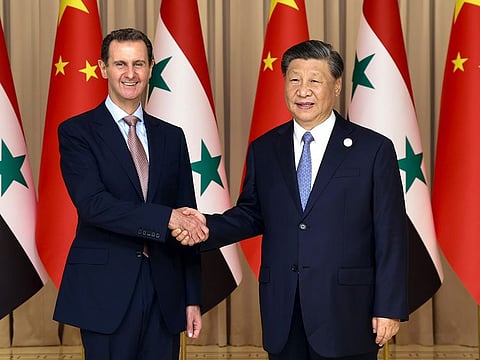China’s Xi calls on West to lift sanctions against Syria
China’s Xi, Syria’s Assad meet in Hangzhou for rare talks

Beijing: China’s President Xi Jinping called on the West to lift sanctions on Syria and offered Beijing’s help in rebuilding the war-shattered country on Friday during rare talks with Syria’s leader Bashar Al Assad.
Their meeting in the Chinese city of Hangzhou gave a boost to Assad’s campaign to return to the global stage while allowing China to advance its strategic interests in the Middle East.
“China opposes interference by external forces in Syria’s internal affairs... and urges all relevant countries to lift illegal unilateral sanctions against Syria,” said a readout of the talks published by Chinese state media.
Xi also told Assad that China would help Syria to rebuild its economy and counter domestic unrest, by upgrading ties to a “strategic partnership”.
Syria joined China’s Belt and Road Initiative in 2022 and was welcomed back into the Arab League in May.
In Chinese diplomacy, a “strategic partnership” implies closer coordination on regional and international affairs, including in the military sphere. It is one grade below what Beijing calls a “comprehensive strategic partnership”.
Western sanctions on Syria have been steadily tightened since the early days of a civil war that began in 2011 and went on to kill hundreds of thousands of people and displace millions.
Assad’s government, backed by Russia and Iran, now controls most Syrian territory and has re-established ties in recent years with Arab neighbours.
Citing flagship initiatives aimed at building up infrastructure along the ancient Silk Road and promoting China’s approach to global security, Xi extended support for Syrian efforts to improve relations with other Arab countries.
“China is reinforcing its message that it is there to try and help countries resolve their disputes and that peace stems from economic development,” said Matteo Legrenzi, professor of international relations at Ca’Foscari, University of Venice.
Sign up for the Daily Briefing
Get the latest news and updates straight to your inbox



